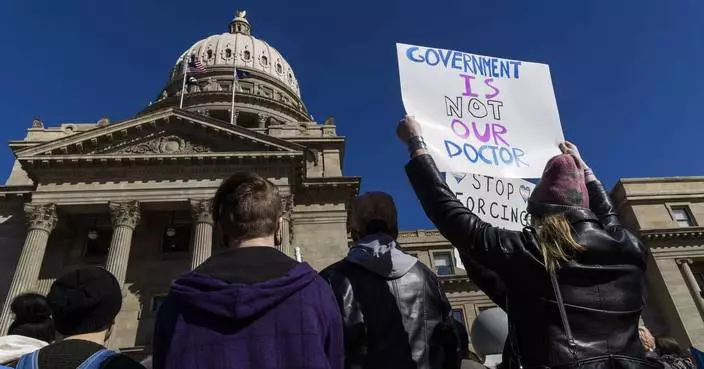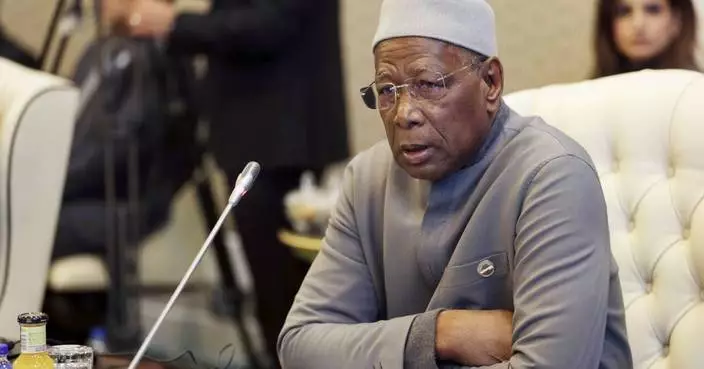The top diplomat in eastern Libya says the shutdown of vital oil facilities in the country would come to an end “when Libyans are guaranteed of the fair distribution of their resources.”
The closures came about when powerful tribal groups loyal to Libyan military commander Khalifa Hifter in January seized several large export terminals along Libya’s eastern coast, as well as southern oil fields. Hifter is allied with the interim government based in the east.
Click to Gallery
The top diplomat in eastern Libya says the shutdown of vital oil facilities in the country would come to an end “when Libyans are guaranteed of the fair distribution of their resources.”
Lahouij spoke to the AP on Friday while on a trip to Russia lasting several days. He attended a conference on the Middle East hosted by the Moscow-based think tank the Valdai Discussion Club.
The Tripoli government controls only a shrinking corner of the country’s west. But it enjoys a different advantage: its control over Libya’s Central Bank, which holds the country’s oil revenue.
Lahouij accused the Tripoli-based government of using oil resources to pay for “mercenaries and foreign pilots” who fight on its side against Hifter forces.
The National Oil Corporation said losses from the oil closures have reached more than $1.85 billion as of Thursday. The daily oil production has since the closure fallen to 122,424 barrels a day from about 1.2 million.
“These resources are protected by our government, and by its army," Abdelhadi Lahouij, foreign minister of the interim government told The Associated Press. “We pay the money for the police to guard the oil facilities, and protect the foreigners who are working in the oil facilities.”
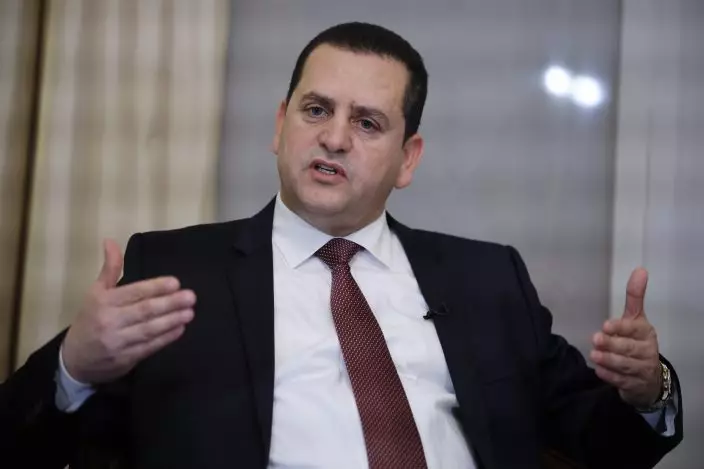
In this photo taken on Friday, Feb. 21, 2020, Abdul Hadi Al-Hweij, the Foreign Minister for the east-based Libyan authorities led by General Khalifa Hifter speaks interview with the Associated Press in Moscow, Russia. (AP PhotoAlexander Zemlianichenko)
Lahouij spoke to the AP on Friday while on a trip to Russia lasting several days. He attended a conference on the Middle East hosted by the Moscow-based think tank the Valdai Discussion Club.
Hifter’s forces, which control the eastern and much of the southern part of the country, launched an offensive in April to capture Libya’s capital, Tripoli, clashing with an array of militias loosely allied with a U.N.-supported but weak government based there.
The closure of the oil facilities was seen as part of Hifter’s efforts to capture Tripoli and punish his adversaries there for sealing security and maritime agreements with Turkey, opening doors for unlimited military support from Ankara. Oil is the main source of revenue in Libya.
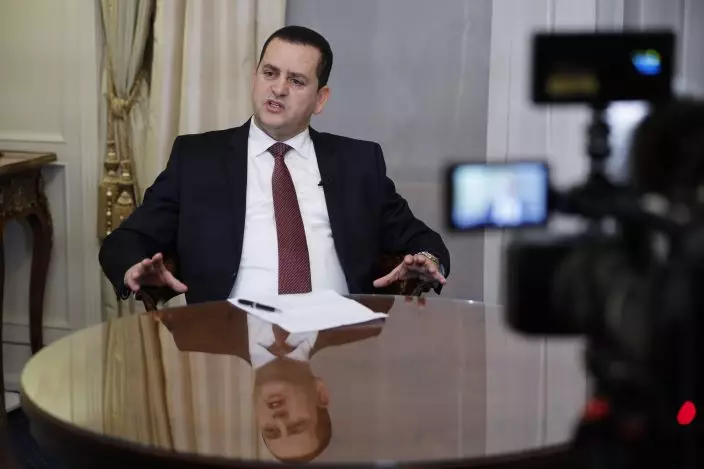
In this photo taken on Friday, Feb. 21, 2020, Abdul Hadi Al-Hweij, the Foreign Minister for the east-based Libyan authorities led by General Khalifa Hifter speaks interview with the Associated Press in Moscow, Russia. (AP PhotoAlexander Zemlianichenko)
The Tripoli government controls only a shrinking corner of the country’s west. But it enjoys a different advantage: its control over Libya’s Central Bank, which holds the country’s oil revenue.
The opaque finances of the bank has drawn sharp criticism. Hifter’s forces accuse the bank of diverting oil assets to pay Syrian mercenaries to defend the capital.
Libya’s National Oil Corporation, which dominates Libya’s critical oil industry and is based in Tripoli, has also called repeatedly for increased transparency.
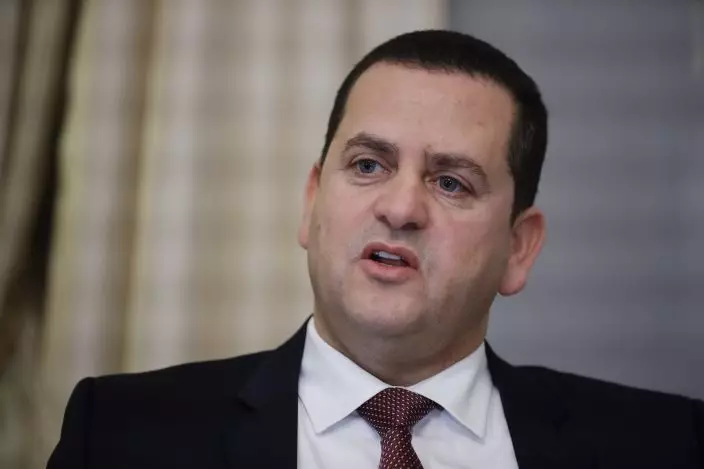
In this photo taken on Friday, Feb. 21, 2020, Abdul Hadi Al-Hweij, the Foreign Minister for the east-based Libyan authorities led by General Khalifa Hifter speaks interview with the Associated Press in Moscow, Russia. (AP PhotoAlexander Zemlianichenko)
Lahouij accused the Tripoli-based government of using oil resources to pay for “mercenaries and foreign pilots” who fight on its side against Hifter forces.
Turkey, which backs the Tripoli-based administration, has sent hundreds of Syrian fighters including militants affiliated with groups such as al-Qaida and the Islamic State group to fight against Hifter's forces.
“When we are guaranteed a fair distribution of resources, this problem will come an end and the oil flow will return as it was,” he said.
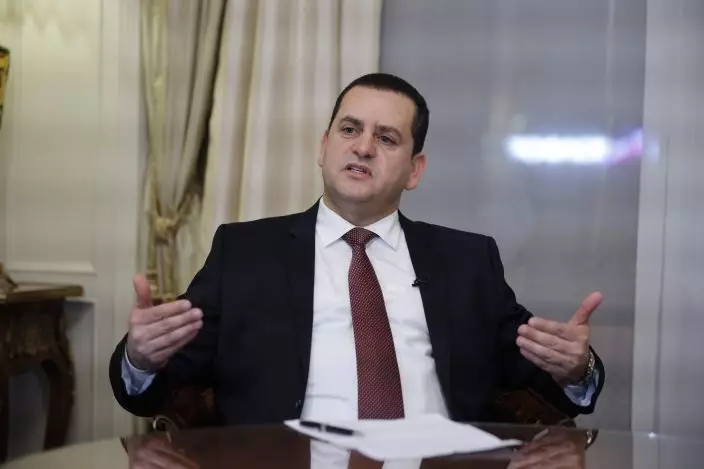
In this photo taken on Friday, Feb. 21, 2020, Abdul Hadi Al-Hweij, the Foreign Minister for the east-based Libyan authorities led by General Khalifa Hifter speaks interview with the Associated Press in Moscow, Russia. (AP PhotoAlexander Zemlianichenko)
The National Oil Corporation said losses from the oil closures have reached more than $1.85 billion as of Thursday. The daily oil production has since the closure fallen to 122,424 barrels a day from about 1.2 million.
Libya has the ninth largest known oil reserves in the world and the biggest oil reserves in Africa.
The Tripoli authorities and U.S. officials have also accused Hifter of relying on hundreds of Russian mercenaries. Sudanese armed groups from the Darfur region recently joined the fighting on both sides, according to a report by U.N. experts.
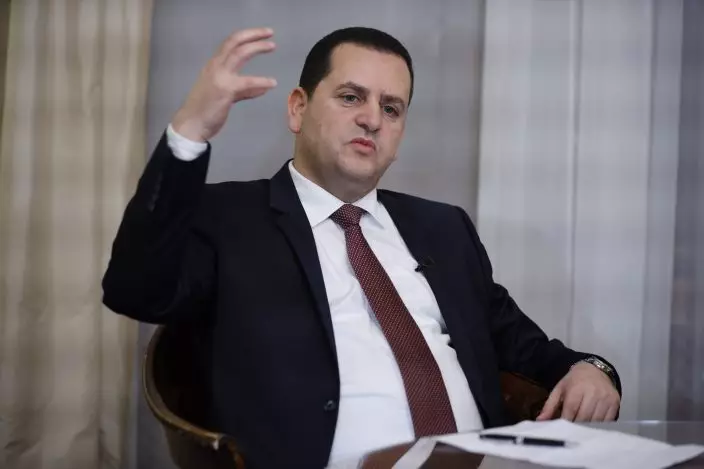
In this photo taken on Friday, Feb. 21, 2020, Abdul Hadi Al-Hweij, the Foreign Minister for the east-based Libyan authorities led by General Khalifa Hifter speaks interview with the Associated Press in Moscow, Russia. (AP PhotoAlexander Zemlianichenko)
Lahouij denied that Russia has provided military assistance to Hifter’s forces. “There is no Russian military aid for... our Libyan army,” he said.
BEIRUT (AP) — Leaked photographs of the son of Libya’s late dictator Moammar Gadhafi and the tiny underground cell where he has been held for years in Lebanon have raised concerns in the north African nation as Libyan authorities demand improvements.
The photos showed a room without natural light packed with Hannibal Gadhafi’s belongings, a bed and a tiny toilet. “I live in misery,” local Al-Jadeed TV quoted the detainee as saying in a Saturday evening broadcast, adding that he is a political prisoner in a case he has no information about.
Two Lebanese judicial officials confirmed to The Associated Press on Monday that the photographs aired by Al-Jadeed are of Gadhafi and the cell where he has been held for years at police headquarters in Beirut. Gadhafi appeared healthy, with a light beard and glasses.
A person who is usually in contact with Gadhafi, a Libyan citizen, said the photos were taken in recent days. All spoke on condition of anonymity because they were not authorized to speak to media outlets.
Gadhafi has been held in Lebanon since 2015 after he was kidnapped from neighboring Syria, where he had been living as a political refugee. He was abducted by Lebanese militants demanding information about the fate of prominent Lebanese Shiite cleric Moussa al-Sadr, who went missing during a trip to Libya in 1978.
The fate of al-Sadr has been a sore point in Lebanon. His family believes he may still be alive in a Libyan prison, though most Lebanese presume al-Sadr, who would be 95 now, is dead.
A Libyan delegation visited Beirut in January to reopen talks with Lebanese officials on the fate of al-Sadr and the release of Gadhafi. The talks were aimed at reactivating a dormant agreement between Lebanon and Libya, struck in 2014, for cooperation in the probe of al-Sadr. The delegation did not return to Beirut as planned.
The leaks by Al-Jadeed came after reports that Gadhafi was receiving special treatment at police headquarters and that he had cosmetic surgeries including hair transplants and teeth improvements. Al-Jadeed quoted him as saying: “Let them take my hair and teeth and give me my freedom.”
Gadhafi went on a hunger strike in June last year and was taken to a hospital after his health deteriorated.
Libya’s Justice Ministry in a statement Sunday said Gadhafi is being deprived of his rights guaranteed by law. It called on Lebanese authorities to improve his living conditions to one that “preserves his dignity," adding that Lebanese authorities should formally inform the ministry of the improvements. It also said Gadhafi deserves to be released.
After he was kidnapped in 2015, Lebanese authorities freed him but then detained him, accusing him of concealing information about al-Sadr’s disappearance.
Al-Sadr was the founder of the Amal group, a Shiite militia that fought in Lebanon’s 1975-90 civil war and later became a political party that is currently led by the country’s Parliament Speaker Nabih Berri.
Many of al-Sadr’s followers are convinced that Moammar Gadhafi ordered al-Sadr killed in a dispute over Libyan payments to Lebanese militias. Libya has maintained that the cleric, along with two traveling companions, left Tripoli in 1978 on a flight to Rome.
Human Rights Watch issued a statement in January calling for Gadhafi’s release. The rights group noted that Gadhafi was only 2 years old at the time of al-Sadr’s disappearance and held no senior position in Libya as an adult.

FILE - In this undated file photo made available Sept. 25, 2011, Hannibal Gadhafi, son of ousted Libyan leader Moammar Gadhafi, watches an elite military unit exercise in Zlitan, Libya. Leaked photographs of Hannibal Gadhafi and the tiny underground cell where he has been held for years in Lebanon have raised concerns. Libyan authorities are demanding that Lebanon improves living conditions for Gadhafi. (AP Photo/Abdel Magid al-Fergany, File)









